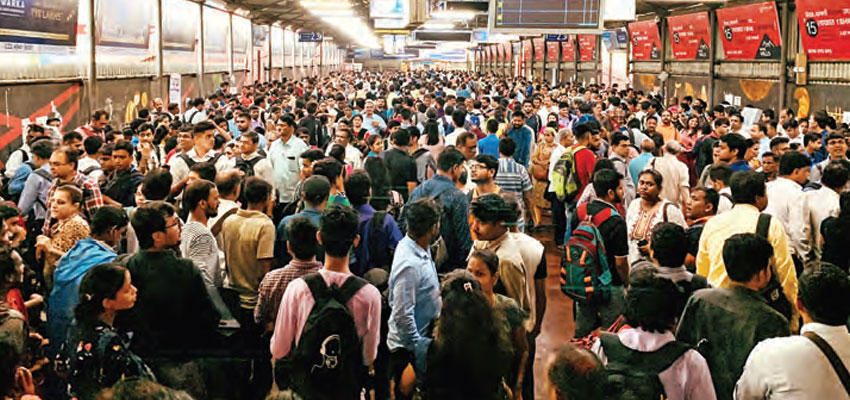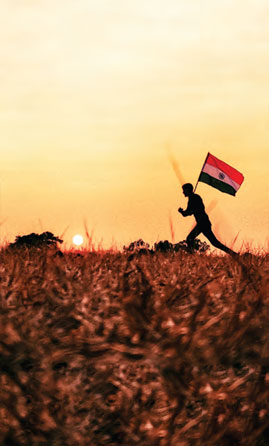People Make a Nation

There are many strides we have made as a nation, but many more that we have not. We have lagged behind nations like China, Japan, South Korea, which have made leaps and bounds in similar time frames. While some reasons can be attributed to economic models that governments have adopted, we as citizens have been wanting too. It’s high time we worked to put the nation first
“The nation exists through us and we exist through the nation”, said Prime Minister Narendra Modi while speaking at a function to celebrate the 75th year of our independence, ‘Azadi ka Amrit Mahotsav’. He also added that there was no difference between personal aspirations on the one hand and national aspirations and success on the other.
Long journey
Our nation represents one of the oldest civilisations in the world. Historians though have laid their hands so far only up to the Indus Valley civilisation of 3000 BC. Our Vedic and pre-Vedic period still remains unvisited by modern historians. We have to learn a lot from our ancient pieces of literature like the Gita, Mahabharata, Vedas and Upanishads. There was a time when our country had the biggest share in the world’s richness and our country was known the world over by the name, the ‘golden bird’. Much water has flown down the Ganges since then. It is time to have a re-look at our country’s journey, at least of the period after independence, as we are celebrating its ‘Amrit Mahotsav’.
We got independence in 1947 with a lot of struggle. Our large country became smaller with the partition on both the eastern and western sides, giving rise to East Pakistan (now Bangladesh) and West Pakistan (now Pakistan) respectively. There were huge flare-ups of communal riots and mass movement of about one million refugees because of partition. Even while facing these problems, Kashmir was attacked by Pakistani tribal gangs, helped by their army, before its annexation with India on 26th October 1947. The POK as it is known today is an illegal occupation by Pakistan of roughly one-third of Kashmir. The matter of POK is still unresolved and on the contrary, Pakistan ceded Shaksgam Valley of Gilgit region of POK to China in 1963. Our geographical area was further reduced by 38,000 sq. km when China attacked our country in 1962. We were not prepared for this war and a part of Ladakh is in their illegal occupation since then, in the area now known as ‘Aksai Chin’.
"Each government since independence has been adding up infra projects in all the important sectors and as a result, India as of today, is the sixth-biggest economy in the world with a GDP of about $2.89 trillion and a forex reserve of $640 billion"
Despite birth-pangs…
Despite the birth-pangs, the country had to move forward. Our lawmakers designed a Constitution, which gave a liberal democratic form of government. Citizens were justiciable in the courts of law. The Constitution mandated the separation of power between the Legislature,Executive and the Judiciary. The world’s biggest democracy got going and it is getting stronger with the passage of time despite the evil forecast of many naysayers.
It is true that India is a country of diversities. We have multiple languages, multiple cultures, multiple religions but the pessimist naysayers forgot that we also have an ancient civilisation that taught us to be together and that democracy was first born in India.
In addition to the birth-pangs, India had several other problems at the time of independence. The population of the country then was 34 crores and its GDP was only Rs.2.7 lakh crores. The literacy rate was a mere 12%. The emphasis was placed to pull the country out of its problems. To begin with, the country started with setting of heavy industries, constructing big dams, establishing central universities and big hospitals. Each government since independence has been adding up infra projects in all the important sectors and as a result, India as of today, is the sixth-biggest economy in the world with a GDP of about $2.89 trillion and a forex reserve of $640 billion. The literacy rate as of today has gone up to 77.70%. Our students have reached all over the world and they are making their presence felt everywhere. The Silicon Valley of the US is filled with our engineers. In fact, people of Indian origin are now heading many big global companies. From being the biggest arms importer, we are now at the brink of being arms exporters also.
"There are many good things to say about what we have done since independence. But there are many things which we have not been able to do. India and China became independent almost at the same time. We were equally poor and equally the most populous countries then. Today, China is the second-biggest economic power and its economy is five times the economy of India"

Global presence
Since independence, there have been many developments and it is not possible to mention them in this small article. However, we should feel proud that we are at the heart of the globe today. We have seen that in the G-20 summit or in the global summit on environment, the views of our Prime Minister were echoed by other world leaders. The biggest problem faced by the world today is the Coronavirus pandemic. Waves after waves of this pandemic have created havoc the world over. It has been remarkable for a developing country like ours to create and manufacture our own vaccine in a short time and go in for mass and free vaccination. Almost 165 crore doses of vaccination (at the time of writing this article) have been administered to our people, including teenagers. Our tally of vaccination doses administered is the highest in the world. Even the number of deaths in our country is lower than in the US, in spite of their lower population. The World Health Organisation has appreciated our efforts. We have also helped the people of some poor countries by sending out our vaccines.
Our forces today are much stronger than they were in 1962. We successfully fought the wars of 1965 and 1971. Modern warfare equipment is being added constantly. In the northern front of Ladakh, our brave soldiers are present to thwart the illegal attempts of China, which we saw in the Galwan Valley where 20 of our soldiers got martyred but only after neutralising the Chinese soldiers. On our other front, we saw the heroics of our army in the Uri sector and of our airforce at Balakot in Pakistan. We entered Pakistan and neutralised a large number of terrorists. The world respected our actions and these actions exhibited the strength of our foreign policy.
Lagging behind
There are many good things to say about what we have done since independence. But there are many things which we have not been able to do. India and China became independent almost at the same time. We were equally poor and equally the most populous countries then. Today, China is the second-biggest economic power and its economy is five times the economy of India. Japan was rocked by atom bombs in the Second World War. But still it has come out of it and is the third-largest economic power today. South Korea is a small country, which also became independent almost along with us but it is now more powerful economically. We have to admit that we have not been able to develop our full potential. We did not nurture the economy as was required. Now after much loss of time, we are picking up the pace for economic acceleration. We remained slow as we did not have the clarity about the model of economy to follow. We earlier followed the socialist model until 1991 when things became very difficult. Thereafter, we changed many things and stopped the licence-raj and we are now following a market economy.
We missed the bus of joining as a permanent member of the UN Security Council, which China did, being a communist country. We are a nuclear power but achieved this power much later. China achieved being a nuclear power much before. We are doing good in the space sector but much is still desired to be done. Indian origin engineers are in the forefront of NASA and thus fuelling US space programmes. India in the ancient times, had world renowned universities like Taxila and Nalanda, but today, we are nowhere in the first 100 university rankings. We have not done enough in this important field of education. The same also applies to the health sector. Many Indians are seen going abroad for the treatment of complicated ailments.
What have we done?
It is very easy to put the blame on governments for things not done but the blame also lies on us, the people. Definitely, the government is a big stakeholder in the happenings of the country, but as the Prime Minister said, the country exists through us. We have not worked hard enough as the Chinese, Japanese and South Koreans. We always craved for jobs in the country and outside but ignored being entrepreneurs who could create jobs and wealth. We studied to pass examinations but not to become innovators. We failed to earn enough for the country. To add more pain, we devised ways to evade tax and not to think about the country. To us, it was not ‘Nation First’ but ‘Family First’. Instead of being good ambassadors of our country, some of us are sullying the name of the nation. We forget that our aspirations are linked with the success of the country. It is not good politics or good economics to say evil things about our country on international platforms. Democracy gives us opportunities to change a government that is not working to our satisfaction but it does not give us an opportunity to weaken the country itself. We have to introspect and move forward.